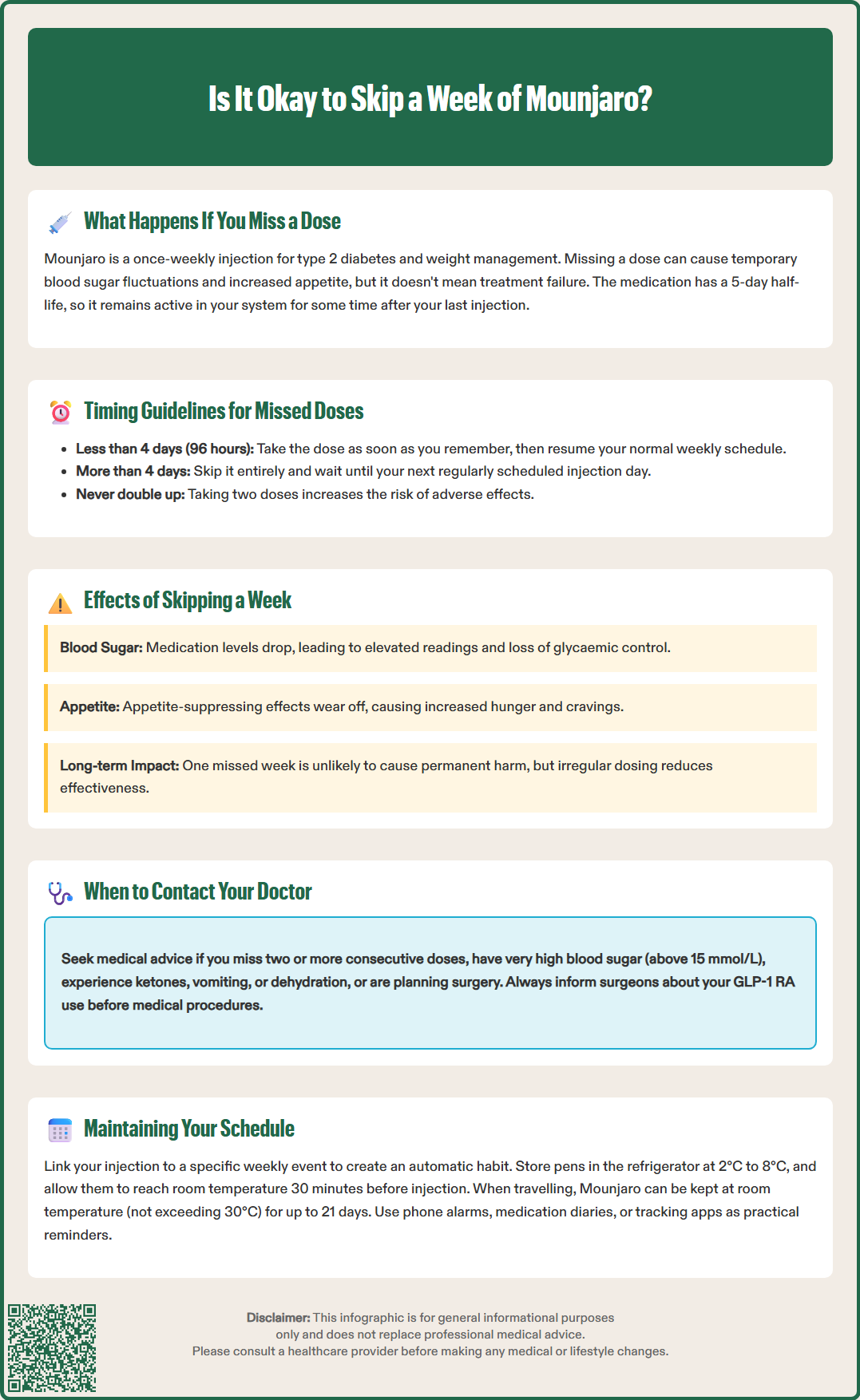
Missing a scheduled dose of Mounjaro (tirzepatide) is a common concern for patients managing type 2 diabetes or weight-related conditions. Mounjaro is a once-weekly injection that works as a dual GLP-1 and GIP receptor agonist, helping to control blood glucose levels and reduce appetite. Whilst skipping a week is not ideal, it does not typically constitute treatment failure. Understanding what happens when you miss a dose, when to take a delayed injection, and how to maintain your schedule can help you manage your treatment safely and effectively. This article provides evidence-based guidance aligned with MHRA-approved prescribing information to help you navigate missed doses confidently.
Quick Answer: Skipping a week of Mounjaro is not recommended but does not typically cause permanent harm; if fewer than four days have passed since your missed dose, take it as soon as possible, but if more than four days have elapsed, skip that dose and resume your normal schedule.

Mounjaro® is the most innovative GLP-1 medication proven to dramatically curb appetite, hunger, and cravings to help professional men achieve substantial weight loss.
Start Here
Wegovy® is a weekly injectable GLP-1 medication with proven effectiveness in reducing appetite, hunger, and cravings to help busy professionals lose significant weight.
Start HereWhen you miss a scheduled Mounjaro injection, your body's response to the medication begins to wane as drug levels decline. The half-life of tirzepatide is approximately five days, according to the MHRA-approved Summary of Product Characteristics (SmPC), meaning the medication remains active in your system for some time after administration. However, missing a dose means you lose the cumulative benefit of consistent weekly dosing, which is designed to maintain steady therapeutic levels. This may result in a temporary rise in blood glucose levels, particularly if you have type 2 diabetes, and a potential return of appetite if you are using Mounjaro for weight management.
It is important to understand that missing a single dose does not constitute treatment failure, nor does it typically mean you need to restart your titration schedule from the beginning. The MHRA-approved prescribing information provides clear guidance on how to manage missed doses to minimise disruption to your treatment plan. If you realise you have missed a dose, do not panic — there are specific steps you can take depending on how much time has elapsed since your scheduled injection day.
If you are taking Mounjaro alongside insulin or sulfonylureas, be aware that missing a dose may affect your blood glucose levels. Monitor your glucose more frequently after a missed dose and consult your healthcare professional before adjusting other diabetes medications.

The timing of when you take a missed Mounjaro dose is crucial to maintaining therapeutic efficacy. According to the MHRA-approved SmPC, if you miss a dose and fewer than four days (96 hours) have passed since your scheduled injection day, you should administer the missed dose as soon as you remember. After taking the missed dose, you can then resume your normal weekly schedule on your originally planned injection day.
However, if more than four days have elapsed since your missed dose, you should skip that dose entirely and wait until your next regularly scheduled injection day. The SmPC also notes that you can change your weekly dosing day if needed, provided there are at least 72 hours (3 days) between doses.
To help remember your injection schedule, consider the following practical strategies:
Set a weekly reminder on your mobile phone or calendar application
Choose a consistent day that fits your routine (e.g., every Sunday evening)
Store your Mounjaro pen in the refrigerator in its original carton to protect from light and out of the sight and reach of children
Use a medication diary or tracking app to record each injection
If you frequently forget doses or find it difficult to maintain your schedule, discuss this with your GP or diabetes specialist nurse. They may be able to suggest additional support strategies or assess whether there are barriers to adherence that need addressing. Never attempt to "double up" on doses to compensate for a missed injection, as this is not recommended in the prescribing information and may increase the risk of adverse effects.
Deliberately or accidentally skipping an entire week of Mounjaro can have several physiological and clinical consequences, though the severity depends on individual factors such as your current dose, diabetes control, and overall metabolic health. When you skip a full week, the medication levels in your system decline substantially, and the therapeutic effects begin to diminish. For individuals with type 2 diabetes, this may manifest as elevated blood glucose readings, increased HbA1c levels if the pattern continues, and a temporary loss of the glycaemic control you had achieved with consistent dosing.
From a weight management perspective, skipping a week may result in increased appetite and food intake as the appetite-suppressing effects of tirzepatide wear off. Some patients report experiencing a return of cravings or hunger signals that had been well-controlled during regular treatment. Additionally, the beneficial effects on gastric emptying diminish, which may lead to changes in satiety and eating patterns. Whilst one missed week is unlikely to cause significant weight regain, it can disrupt the momentum of weight loss and make it psychologically more challenging to maintain dietary adherence.
There is no official evidence to suggest that skipping a single week of Mounjaro causes permanent harm. However, if you skip multiple consecutive doses or develop an irregular pattern of administration, you may experience:
Reduced overall efficacy of the medication
Increased variability in blood glucose control
Possible gastrointestinal side effects when resuming treatment, which may vary between individuals
If you have deliberately skipped a dose due to side effects, illness, or other concerns, it is essential to contact your prescribing clinician before resuming treatment. They can assess whether dose adjustment or additional support is needed to optimise your treatment experience.
If you experience persistently high blood glucose levels (for example, above 15 mmol/L), have ketones present in your blood or urine, or become unwell with vomiting or dehydration after missing a dose, seek urgent medical advice.
Maintaining a consistent Mounjaro injection schedule is fundamental to achieving optimal therapeutic outcomes, whether your treatment goal is improved glycaemic control, weight management, or both. Adherence to once-weekly dosing ensures stable medication levels, minimises fluctuations in blood glucose, and reduces the likelihood of experiencing adverse effects when doses are missed and then resumed.
Practical strategies for schedule maintenance include establishing a routine that integrates your injection into your weekly activities. Many patients find success by linking their Mounjaro dose to a specific weekly event, such as a particular television programme, a day of the week when they perform other health-related tasks, or a time when they are typically at home and relaxed. Consistency in both the day and approximate time of administration helps create a habit that becomes automatic over time.
Proper storage and preparation also support adherence. According to the SmPC and Patient Information Leaflet, Mounjaro pens should be stored in the refrigerator at 2°C to 8°C, in the original carton to protect from light, and kept out of the sight and reach of children. Do not freeze. Before injection, the Patient Information Leaflet advises allowing the pen to reach room temperature (approximately 30 minutes) to reduce injection site discomfort. Keep your pens in their original packaging until use, and regularly check your supply to ensure you do not run out unexpectedly. If you are travelling, Mounjaro can be kept at room temperature (not exceeding 30°C) for up to 21 days, making it feasible to maintain your schedule whilst away from home.
When to seek medical advice:
If you have missed two or more consecutive doses
If you experience persistent or severe gastrointestinal symptoms that make you reluctant to continue treatment
If your blood glucose levels remain elevated despite resuming your regular schedule
If you are planning surgery or medical procedures that may affect your dosing schedule (inform your surgeon and anaesthetist about your GLP-1 RA use due to potential effects on gastric emptying)
If you have concerns about side effects or treatment efficacy
Your healthcare team, including your GP, practice nurse, or diabetes specialist, can provide personalised guidance on managing your Mounjaro treatment. NICE guidance (NG28) on type 2 diabetes management emphasises the importance of individualised care and regular review of all glucose-lowering therapies. If adherence challenges persist, your clinician may explore alternative treatment options or additional support services to help you achieve your health goals whilst maintaining treatment safety and effectiveness.
If you suspect you have experienced any side effects from Mounjaro, you can report these through the MHRA Yellow Card Scheme (yellowcard.mhra.gov.uk).
If fewer than four days have passed since your scheduled dose, take the missed injection as soon as you remember and resume your normal weekly schedule. If more than four days have elapsed, skip that dose entirely and wait until your next regularly scheduled injection day.
Yes, missing a week may cause temporary blood glucose fluctuations as medication levels decline, particularly if you have type 2 diabetes. Monitor your glucose more frequently after a missed dose and contact your healthcare professional if levels remain persistently elevated.
No, never double up on doses to compensate for a missed injection. This is not recommended in the prescribing information and may increase the risk of adverse effects such as gastrointestinal symptoms.
All medical content on this blog is created based on reputable, evidence-based sources and reviewed regularly for accuracy and relevance. While we strive to keep content up to date with the latest research and clinical guidelines, it is intended for general informational purposes only.
DisclaimerThis content is not a substitute for professional medical advice, diagnosis, or treatment. Always consult a qualified healthcare professional with any medical questions or concerns. Use of the information is at your own risk, and we are not responsible for any consequences resulting from its use.